UNSW researchers named as 2022 Eureka Prize finalists
Six UNSW Sydney projects chosen as finalists for Australia’s leading science awards.
Six UNSW Sydney projects chosen as finalists for Australia’s leading science awards.
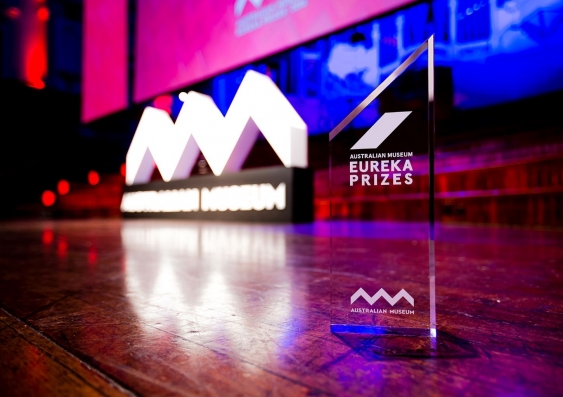
Yolande Hutchinson
UNSW Sydney External Engagement
0420 845 023
y.hutchinson@unsw.edu.au
Studying the impact of the 2019-2020 bushfires, developing mentorship programs to foster a new generation of leaders in cancer research and pioneering work to treat widespread genetic disorders are among six UNSW Sydney projects nominated for the 2022 Australian Museum Eureka Prizes, Australia's most high-profile science awards.
Presented annually by the Australian Museum, 14 Australian Museum Eureka Prizes are awarded across four categories including research and innovation, leadership, science engagement and school science.
UNSW researchers have been named as finalists for their outstanding achievements in the fields of research and innovation, leadership, and science engagement.
Winners will be announced at an Award Ceremony on Wednesday 31 August 2022.
The UNSW finalists are:
Professor Maria Kavallaris AM, Children’s Cancer Institute and UNSW Medicine & Health
University of Technology Sydney Eureka Prize for Outstanding Mentor of Young Researchers
Prof. Kavallaris is internationally renowned for her leadership, research and advocacy in the treatment of childhood cancer.
She is a Director of the Australian Centre for NanoMedicine at UNSW and Head of Translational Cancer Nanomedicine at the Children’s Cancer Institute. She has made important discoveries in relation to the mechanisms of clinical drug resistance and tumour aggressiveness in childhood cancer.
“I’m incredibly inspired by the early career researchers I’ve been privileged enough to mentor over the last 25 years - they are passionate, innovative and committed to paying it forward,” Prof. Kavallaris said.
“Ensuring the next wave of researchers are given opportunities to remain committed to this research is incredibly important to me.
“Through a creative program of mentorship programs I’ve established, we’ve been able to foster a new generation of research leaders in cancer research and nanomedicine.”
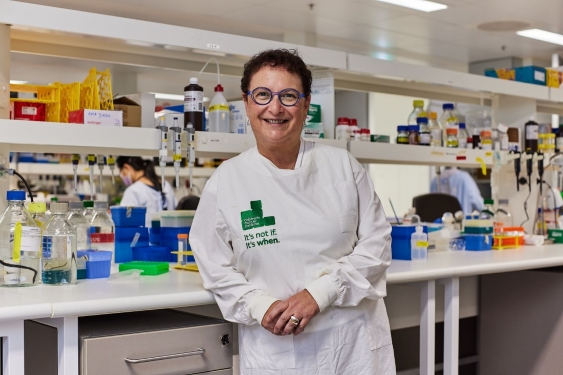
Professor Maria Kavallaris AM. Photo: UNSW.
Professor Raina MacIntyre, the Kirby Institute at UNSW
Eureka Prize for Leadership in Science and Innovation
Prof. MacIntyre is Head of the Biosecurity Program at the Kirby Institute at UNSW. She is a world-leading researcher on respiratory protective devices, pandemics, smallpox, and emerging infectious diseases.
She leads a NHMRC Centre for Research Excellence in airborne threats to health and an automated, artificial intelligence-powered open source rapid epidemic intelligence observatory (EPIWATCH), which detects early signals of serious epidemics globally.
Prof. MacIntyre served as UNSW Head of the School of Public Health and Community Medicine from 2008-2018; expanding the School from 400 to over 1200 students and developing an international reputation for research and teaching excellence. Over the past two years, she has been one of the most sought-after pandemic expert commentators on COVID-19 in the media.
“Leadership in science is about being true to your original ideas and pursuing them in the face of obstacles and striving to be yourself rather than coveting what someone else is doing. It is also about mentoring and building the next generation of diverse researchers and providing them opportunities for growth,” Prof. MacIntyre said.
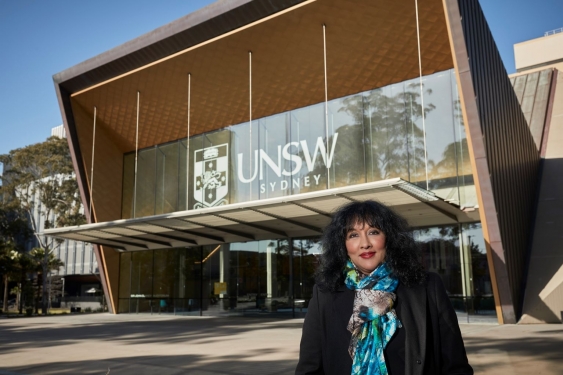
Professor Raina MacIntyre. Photo: UNSW.
Scientia Professor Veena Sahajwalla, UNSW Science
Celestino Eureka Prize for Promoting Understanding of Science
Prof. Sahajwalla is an internationally recognised materials scientist, engineer and inventor renowned for pioneering the transformation of waste for use as a new generation of ‘green’ materials and products.
As the Founder and Director of UNSW’s Centre for Sustainable Materials Research and Technology (SMaRT), she has developed new ‘microrecycling science’ technologies, that re-form problematic waste not usually subject to conventional recycling, into new products and manufacturing materials.
A career priority of Prof. Sahajwalla’s has been to communicate the science of sustainability to broad community audiences. She was named as the 2022 NSW Australian of the Year, as well as a finalist for 2022 NSW Women of the Year (Woman of Excellence). She speaks to numerous webinars, conferences and events, is a highly sought-after media commentator, and regularly provides advice to community and not-for-profit organisations.
“It is vitally important to continue the progress made on encouraging greater participation in STEM. This participation will increasingly play an important role in industry, in the economy and in the way communities shape the future. The microrecycling science and new technologies I and my team are pioneering show how science and engineering play such a vital role in helping to solve the many challenges we face to improve our environmental, social and economic wellbeing,” Prof. Sahajwalla said.
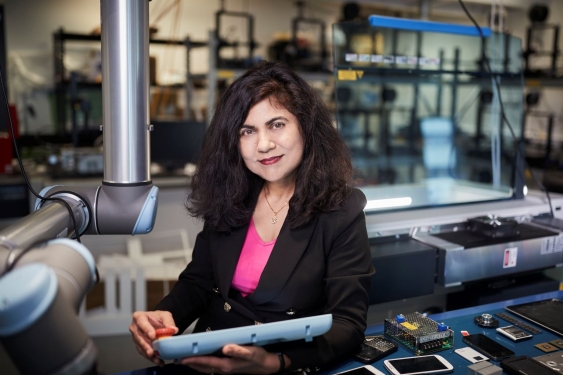
Scientia Professor Veena Sahajwalla. Photo: UNSW.
Scientia Professor Toby Walsh, UNSW Engineering
Celestino Eureka Prize for Promoting Understanding of Science
Prof. Walsh is a leading researcher in Artificial Intelligence (AI). He applies AI to help attack many of the UN's sustainable development goals. For instance, his award-winning work on cost sharing has been used to re-balance the supply networks of leading food manufacturers and has saved thousands of tonnes of carbon emissions.
Prof. Walsh has taken a major role in advocacy and public engagement in response to the growing uptake of AI, in particular questions relating to how will it transform our society? and issues such as data governance. He recently co-chaired a major report for the Academy of Science and Minderoo Foundation on the use of data in professional sport.
He writes for many media outlets including The Guardian, Sydney Morning Herald, and The Conversation and over the past two years, Prof. Walsh has been interviewed by the media almost every day. He has spoken at clubs, festivals, primary schools, high schools, boards, government departments, industry associations, as well as to leading think tanks.
“Whether it be COVID or climate, we're discovering painfully the importance of listening to the science. As an AI researcher, I feel a real responsibility then to inform the important conversation about how we adopt AI responsibly,” Prof. Walsh said.
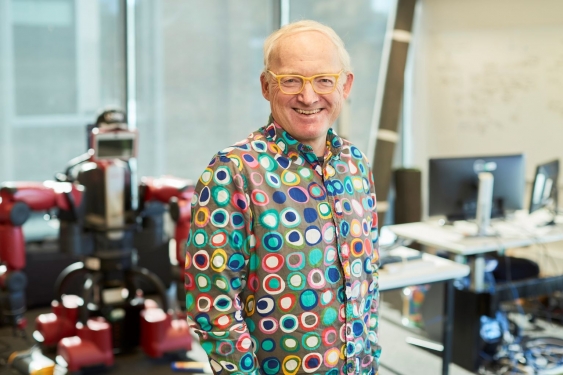
Scientia Professor Toby Walsh. Photo: UNSW.
Scientia Associate Professor Kate Quinlan and Professor Merlin Crossley, UNSW Science
UNSW Eureka Prize for Scientific Research
A/Prof. Quinlan and Prof. Crossley, Deputy Vice-Chancellor Academic and Student Life, have carried out pioneering work to treat widespread genetic disorders – such as Sickle Cell Disease and beta-thalassaemia. 350,000 children are born with these conditions each year.
They developed a new form of gene therapy – where no new genetic material is introduced – but a simple change is made to turn an ‘off switch’ on to provide foetal globin that alleviates disease.
A/Prof. Quinlan and Prof. Crossley are collaborating with the biotech sector and researchers globally to optimise this therapy and continue to understand the switch in the hope of one day moving from gene therapy to pharmaceutical agents that can also reverse the switch.
“Initially we were just trying to understand how human genes were turned on and off. Over time technologies advanced and now our research is informing better approaches to gene therapy, involving flicking genetic switches,” Prof. Crossley said.
“We studied naturally occurring beneficial human mutations that alleviate the symptoms of sickle cell disease. Understandings from our CRISPR gene editing research pave the way for important new treatments,” A/Prof. Quinlan said.
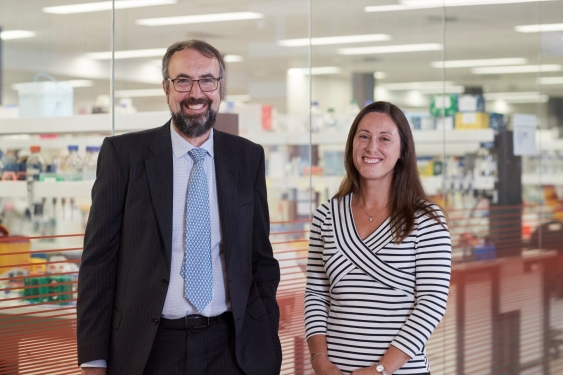
Professor Merlin Crossley and Scientia Associate Professor Kate Quinlan. Photo: UNSW.
PhD candidate Casey Kirchhoff, Dr Mark Ooi, Associate Professor Will Cornwell, Professor Richard Kingsford and PhD candidate Thomas Mesaglio, The Environment Recovery Project at UNSW Science
Department of Industry, Science, Energy and Resources Eureka Prize for Innovation in Citizen Science
UNSW’s Environment Recovery Project has been integral to studying the impact of the 2019-2020 bushfires that devastated 24 million hectares of Australian bushland.
The Project has mobilised 1600 volunteers who have made more than 25,000 observations helping track damage, biodiversity loss and gathering vital recovery data.
“We started the Environment Recovery Project in the hope of gathering scientifically meaningful biodiversity data by engaging everyday people in bushfire recovery via citizen science. The Project has exceeded our expectations, both in terms of the volume of data generated, and importantly, the meaningful, ongoing engagement with project members right across the country,” PhD candidate Ms Kirchhoff said.
“The Environment Recovery Project being nominated for a Eureka Prize is a testament to the work of citizen scientists and the value of citizen science to biodiversity research.”
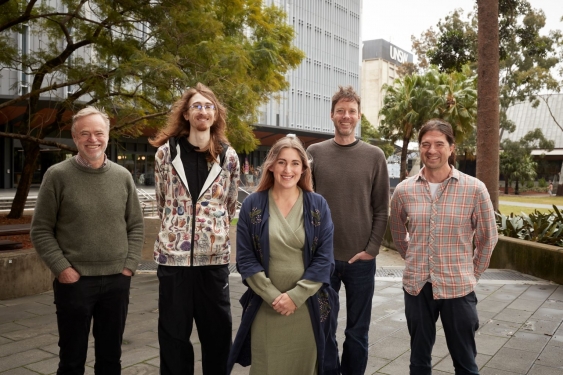
Members of Environment Recovery Project Team, from UNSW's School of Biological Earth and Environmental Sciences. Richard Kingsford, Thomas Mesaglio, Casey Kirchhoff, Will Cornwell and Mark Ooi. Photo: UNSW.